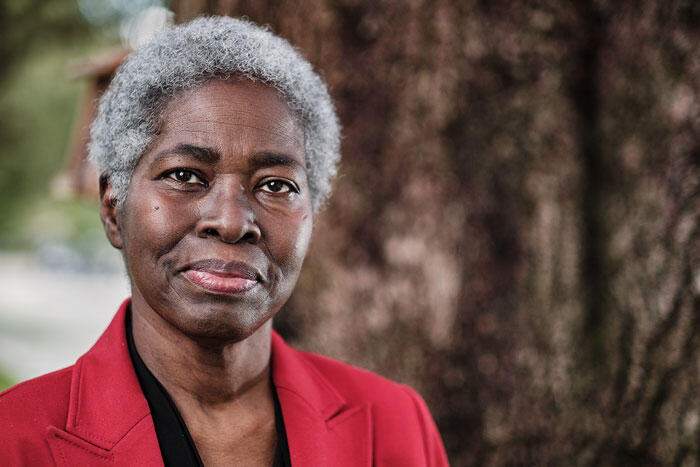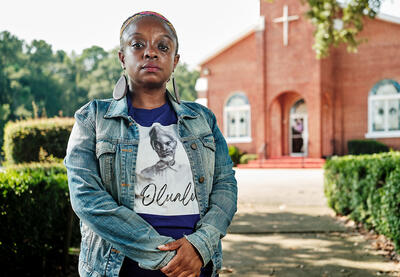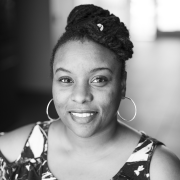Since 2019, news reports have focused on the discovery of the Clotilda, the last known ship transporting enslaved Africans to the United States. In 2022, Netflix released the documentary Descendant, which features divers pulling fragments of the vessel from the Alabama River and explores how descendants living in Africatown—a community founded by some of the people held captive on that ship—engage with this history.
Above: Joycelyn Davis, a descendant of Clotilda survivor Charlie Lewis, aims to strengthen her community and keep the history of Africatown alive.
What is profound about the film is that residents ponder what is to be gained from pulling the Clotilda from the river and who will benefit from it. After all, they’ve long known the ship rested beneath the murky waters. For generations, elders in the community had been sharing stories about the people aboard the ship. The Clotilda’s rediscovery was confirmation for the rest of the world.
During another poignant moment in Descendant, Africatown community activist Anderson Flen visits the Equal Justice Initiative’s National Memorial for Peace and Justice in Montgomery, Alabama. He wonders if such places move people to action. While there, he says, “People come, and they see. Then what do they do? The real test, a lot of times, is not in coming. It’s, ‘What do you do when you leave?’”
That begs the question: What is our responsibility when we uncover history or examine it more closely?
Descendants of enslaved people have some ideas. While every person must decide what their own journey looks like, local history advocates say preserving and correcting history, educating your community about that history, and finding ways to heal are some first steps.
Valid Concerns
Africatown, a neighborhood in northern Mobile, Alabama, was formed by some Clotilda survivors. Residents today share concerns that the city stands to profit from potential tourism surrounding Africatown and the Clotilda story. They fear their stories—and their lives—will be ignored. History has proven their concerns are valid.
Cities across the country receive tourism dollars through museums and tours that tell the stories of enslaved Africans and their descendants. Yet in those cities, laws and attitudes that allowed slavery and segregation continue today, deepening oppressive conditions.
In the mid-20th century, Africatown’s population peaked at 12,000, but since then, policy decisions—like the construction of a highway that cut through the community, a lack of infrastructure investment and Mobile’s rezoning to accommodate chemical industries—have led to a dramatic decline (a fate shared by many other Black neighborhoods in the U.S. targeted by destructive urban planning). Today, only about 2,000 residents remain in Africatown. Some residents have grappled with adverse health outcomes from the toxic effects of paper plants polluting the land and air.
A descendant of Timothy Meaher—who in 1860 illegally smuggled Africans on the Clotilda into the U.S.—leased out the land in Africatown to a paper company in 1928. Since then, industries have thrived in Africatown while the people struggled. Thus, a cycle of injustice continues. Enslavement morphed into structural and environmental racism. This is not unique to Africatown.
Around the world—from Haiti to Selma, Alabama—Black people have exemplified resilience, resistance and self-sufficiency. Those communities, steeped in rich history, gave us all a template for liberation and upholding democratic values, models that are undermined or neglected by the broader society. Examining histories in these places helps us draw connections between slavery and the quality of life for descendants of enslaved people.
Preserving and Sharing a Rich History
Joycelyn Davis, an Africatown resident featured in Descendant, considers Anderson Flen’s questions as she spreads the word—now her life’s purpose—about her ancestors’ history. Davis dreams of having sites, tours and events that draw people in, like the Birmingham Civil Rights Institute and Montgomery’s Legacy Museum.
“I can’t turn away from it,” Davis says. “I’m passionate about it because I’m still here. I have traveled the world with the film, and I see things. And it’s honestly most depressing when I get back home to see that we don’t have the things that our neighbor has.”
Davis is a sixth-generation descendant of Charlie Lewis, who helped establish Lewis Quarters, a section of Africatown. Zora Neale Hurston mentions him in Barracoon: The Story of the Last “Black Cargo.”
Residents of Africatown, the only U.S. community known to be established by immediate survivors of the Middle Passage, were filled with pride and built a community based upon their African values, cultures and traditions. Their community served as a haven from both white violence and the isolation of Africans born in the U.S. without a strong connection to the African continent.
Davis has lived in the area her entire life, and some of her family members still live in Lewis Quarters. She attends the church her ancestors founded, where a bust of Cudjoe Lewis (whose story is told in Hurston’s Barracoon) has stood since 1959. Davis’ grandmother, born in 1899, could easily trace the family’s history. “We’ve just always been in tune,” Davis says.
In Lewis Quarters, community members have hosted festivals where historian Lorna Woods shared the oral history of Africatown. A series of VHS recordings showing Woods sharing the stories was integral to Descendant’s creation, thanks to the help of co-producer Kern Jackson, Ph.D., a folklorist and professor at the University of South Alabama.
Oral histories have been essential for Black people in the U.S. because their experiences—their contributions to society and even their very existence—were not always included in public records.
Respecting Oral Traditions and Correcting History
Oral stories drew Phebe A. Hayes, Ph.D., to her work in Iberia Parish, Louisiana. Like Davis, she advocates for young people to learn the story of their families and communities from their elders, especially after Hayes stumbled upon a book at a local library that proved African Americans were deliberately excised from the official history of Iberia Parish. Her research—including some of her own family’s stories—was the impetus for founding the Iberia African American Historical Society (IAAHS).

She says oral histories are valuable in guiding research. For instance, the library book Hayes found claimed to celebrate all doctors in her parish throughout history. However, 21 Black physicians were left out, including one who lived about a block from Hayes.
“If it hadn’t been for those stories my grandmothers told me, it would not have been immediately apparent to me how wrong that book was in terms of leaving out all these Black doctors,” she says.
Hayes learned the story of Dr. Emma Wakefield-Paillet, the first Black woman to get a medical degree from a Louisiana medical school and the first woman of any race. She was also the first Black woman to open a medical practice.
“Prior to this, someone else had been getting credit for this honor, so we corrected that history,” Hayes says.
Hayes can’t keep her discoveries to herself. Through her organization, the IAAHS, she shares findings with the community, holding talks and symposiums with the help of local experts.
“The history we’re uncovering is local history that is owned by all of us,” Hayes says. “And sometimes it’s pretty history, and sometimes it’s not so pretty, but at least we’re being honest.”
The National Trust for Historic Preservation invited the IAAHS for a residency at the visitor’s center at the Shadows-on-the-Teche, a plantation home in New Iberia’s Main Street District.
Until recently, the stories of that home focused on wealthy white enslavers, not the people enslaved there who made the wealth possible. Visitors now learn about New Iberia’s role in the Civil War and how that affected enslaved people and Black soldiers.
“We’re [helping] them to reinterpret the history of the Shadows,” Hayes says, referring to those once left out of the records. “Just our existence in residency communicates to the public that we are changing.”
Our Shared Responsibility Outside of Schools
Learning and sharing honest history can happen at libraries, museums, historical society events and resource centers.
“Educators can make recommendations all they want,” Hayes says. “The politicians will decide what they agree to, just like we see unfolding in some other states. To me, people have a responsibility as citizens to educate themselves, to continue to read.”
In Mobile, Davis says she hasn’t noticed a negative effect from the nationwide assault on teaching honest history, as the Africatown story is widely shared and included in local school textbooks. She says Black-led organizations are all in a position to fill in the gaps.
“[People] talk about things being whitewashed, but we can create our ways to teach our kids,” Davis says.
It’s been vital for Davis to engage local children with this history and move them from shame to pride. She recounts not embracing her ancestors’ history when she was younger.
“It was taught like, ‘They were captured.’ We didn’t use the word enslaved. They were slaves. And then, people teased you if you had African [ancestry] in your family. If you had white people in your family, if you had Indian in your family, you felt some kind of sense of pride. How do we give our kids that sense of pride of what they did when they got here?”
Davis says she notices depression and low self-esteem in her community’s young people. She says it’s imperative for them to know they come from people who resisted and were resilient and proud.
Acknowledgment and Education
People cannot heal if they don’t know what wounded them. And communities cannot reconcile if people don’t know their shared history. Acknowledgment and education are prerequisites to healing and reconciliation.
Jo Banner—who, with her twin sister, Joy Banner, Ph.D., operates the Descendants Project—works to reject the “narrative violence of plantation tourism” in Louisiana’s River Parishes by uplifting the stories of enslaved people and their descendants.
Headquarters for the Descendants Project is in an 1806 plantation home, but the sisters didn’t know the property’s history at the time of purchase. They also later learned that their ancestors were connected to that and other homes in the parish. The Banners say healing can happen in the very place where the injury occurred. The home today serves as a resource center for descendants of enslaved people.
“You can always use it for good, and you can add on to the history,” Banner says. “What we wanted to make sure is that we can use it to heal the community.”
From that home, they support the community’s well-being and aim to protect the environment, keeping large chemical plants from buying and polluting the land. Just like in Africatown, the region’s residents have experienced adverse health outcomes due to powerful industries—so much so, it’s referred to as “Cancer Alley.”
Banner, who’d represented plantation homes when she worked in tourism, saw history presented in ways that did not respect the humanity of enslaved people. Connecting with that history changed her work and her life.
“When I went to a plantation and I saw my ancestor’s name on the wall at a memorial, and his slave papers as part of the museum on display, that changed me,” Banner says. “I started to rebel in a good way.”
Banner bucked the old plantation tourism system, ultimately losing her job. Her insistence on the truth later birthed the Descendants Project in 2019. She has spoken at the United Nations about environmental injustice, and she challenges companies and organizations to prevent further harm to the land.
“I give testimony from the fence line and speak the truth, and I’ve done this in front of companies that I know their bottom dollar relies on the plastics and other stuff that’s poisoning us,” Banner says.
For healing, Banner also stresses the need for Black people to take control of their narratives and unapologetically be themselves.
“I think healing for us is really getting to a state where we were allowed to exist without us having to validate our existence,” she says. “We need the freedom to exist the way we want.”
In the Spirit of Sankofa
On July 8, 2023, Clotilda survivors’ descendants honored their ancestors in ceremonies prior to the opening of Africatown’s Heritage House, a museum focusing on the people aboard the Clotilda. The official opening, on July 9, marked the day the ship landed on the Alabama shore. Curating the stories and educating the community are vital. Still, Davis contends that a greater priority is to redevelop their community. She longs for young people to embrace Africatown and fight to improve it.
“The history is rich, but it doesn’t match the neighborhood,” she says. “I’ve lived here all my life, and my age group and younger have been taught to leave. How do we teach our kids to love their neighborhood? We’ve been taught to leave the ‘hood’ … but nobody has taught us to stay there and help redevelop it.”
Davis is eager to recapture the spirit of Africatown and other Black-founded communities that once thrived. She says she won’t rely on Mobile city officials to do the right thing.
“As you think about Tulsa and even Africatown, how people created their own, and they were not dependent on everything,” Davis says. “That’s how our ancestors were. They created their own. I really don’t worry about the city. We should, but I’m thinking of ways of doing my own.”
But she’ll continue to nudge people to act when learning about honest history at historical sites. Channeling Anderson Flen’s words, she stresses, “What are you charged to do?”

